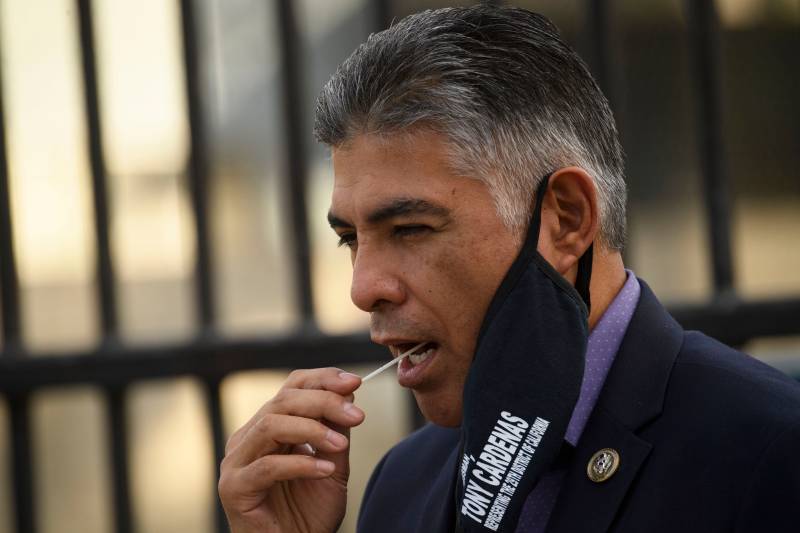Collectively, they claim Facebook’s efforts to scrub Spanish-language content of political and health-related misinformation and disinformation have been underwhelming.
U.S. Rep. Tony Cárdenas, D-Los Angeles, is on board with the campaign, because, he says, this issue is as personal to him as his 78-year-old mother-in-law.
“My mother-in-law is saying, ‘Is it true that there’s some kind of an electronic thing that they’re going to put in your body?” he said during a press conference the coalition held last week.
Cárdenas was referring to one of the most popular myths that has spread across the internet, in multiple languages: that the COVID-19 vaccine contains a microchip that allows the government to track people. Cárdenas says Facebook — by far the largest social media company, which owns three popular platforms, including WhatsApp and Instagram — has the money to do more, and should do more, before federal lawmakers force it to do more.
“It should not be left to the not-for-profits and to the community at large to do the job Facebook admits that they actually do in English. I’m not saying that they do a good job in English, but the job that they’re doing in Spanish and in other languages is almost nonexistent by comparison,” Cárdenas said.
According to a recent study published last year by the human rights nonprofit Avaaz, just 29% of misinformation in Spanish is flagged on Facebook, compared to 70% of comparable material in English.
The study found, for example, that it took 22 days for Facebook to flag a video in Spanish that falsely claimed the virus was deliberately created in a lab at the Institute of Virology in Wuhan. It took nine days for the video to be fact-checked and another 13 days for the company to add the misinformation warning.
By that time, the video had already been viewed 33 million times.
‘Aggressive’ Steps
Facebook spokeswoman Dani Lever told KQED in an email that the social media giant is taking “aggressive” human and automated steps to fight misinformation in Spanish and dozens of other languages, including by removing millions of pieces of misleading content related to COVID-19 and the vaccine.
The company, she added, wants “to continue our dialogue with these [advocacy] groups to strengthen our approach.”
Representatives from YouTube and Twitter said much the same thing.
“Our community guidelines and approach to misinformation apply to all content in any language. And we have reviewers and raters in all relevant languages, looking at e.g. Spanish videos when flagged,” said Elena Hernandez, a spokeswoman for Google, whose parent company owns YouTube, said in an email.
Twitter spokesman Trenton Kennedy wrote that his company’s goal was to eventually use both automated and human review to address content that violates its COVID-19 vaccine misinformation rules.
“Machine learning and automated language processing takes time to be effective,” he wrote. “As such, we will begin with English-language content first and use this same process as we work to expand to other languages and cultural contexts over time.”

